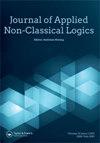具有感染力和透明性的情感主义
Q1 Arts and Humanities
引用次数: 2
摘要
像艾尔这样的情感主义者声称,道德句子缺乏认知意义,因为它们只表明对行为的态度上的赞同或不赞同。在本文中,我探讨了这种观点的两个非经典语义框架。特别地,我研究了传染逻辑和透明逻辑的语义。最后,我展示了这些语义框架如何解释这些无意义的道德句子的逻辑行为及其对道德推理的影响;特别是,每个框架如何解决Jörgensen的困境(一种情绪主义变体)。本文章由计算机程序翻译,如有差异,请以英文原文为准。
Infectious and transparent emotivism
Emotivists like Ayer claim that moral sentences are devoid of cognitive meaning since they only evince attitudinal approval or disapproval of actions. In this paper, I explore two non-classical semantic frameworks for such a view. In particular, I look into the semantics for an infectious logic and a transparent logic. Finally, I show how each of these semantic frameworks accounts for the logical behaviour of these meaningless moral sentences and their upshots to moral reasoning; in particular, how each framework addresses (an emotivist variant of) Jörgensen's dilemma.
求助全文
通过发布文献求助,成功后即可免费获取论文全文。
去求助
来源期刊

Journal of Applied Non-Classical Logics
Arts and Humanities-Philosophy
CiteScore
1.30
自引率
0.00%
发文量
8
 求助内容:
求助内容: 应助结果提醒方式:
应助结果提醒方式:


